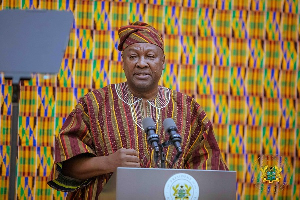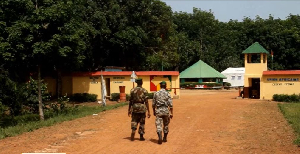Ghana is a property-leasing democracy. This should change. We the citizens of Ghana, in order to change our property-leasing democracy, and secure our property interests in lands located in Ghana, should repeal laws and abolish customs, traditions, and practices that prevent chiefs from creating freehold interests in or over stool lands, so that we can actually own our lands and houses, and not just lease them.
Many Ghanaians have a dream of owning their own houses in Ghana. It takes a long time, money, and efforts to acquire a plot of land for building a house in Ghana. It takes an even longer time, more money, and great efforts to build a house on that plot of land in Ghana.
Despite the odds, some achieve their dreams and are able to build their houses in Ghana. Some of these houses are worth hundreds of thousands of U.S. dollars and some are even worth over a million U.S. dollars in an economically-challenged country like Ghana. In any case, many eventually become landlords. Or, do they? Are they really the lord of the land?
Most people who have acquired a plot of land or a house in Ghana do not think they have leased the land or house. Almost all of them believe they have bought it. If you are one of them, please take a look at your land ownership document that you signed and/or registered with the Lands Commission or Land Title Registry. For most people, chances are the document is a lease or an indenture wherein a stool, skin, person, estate developer, entity or the government, as the owner or lessor of the parcel of land, leases a residential plot of land to you, as a lessee, for 99 years or less, subject to renewal based on satisfaction of certain covenants and conditions. If yours is an allocation paper, you probably have one year to start construction of the building and 2 or 3 years to complete it; otherwise, the stool may re-enter and take back the land you bought.
If the land is for agricultural, commercial or industrial purposes, the lease term is no more than 50 years. If you bought the land or house from someone who bought the land from a chief, government or another person or entity such as an estate developer, you received an assignment or a sublease of the unexpired residue of the original lease term, not the 50 years or 99 years.
In some cases, at the expiration of the lease term, whether it is 50 years or 99 years, and any extension thereof, you are required to give back the land and any buildings or improvements thereon to the stool or government or lessor, as the case may be. In addition, if you violate any of the covenants or conditions during the term of the lease, the stool or government or lessor has the right to re-enter the land, take possession, and kick you out of the house you built with your own hard earned money, in the same way some landlords kick out tenants. So much for being a landlord!
In effect, if you buy a plot of land for $10,000 and build your house on it at a cost of $100,000, the stool, government, estate developer or person who sold you the plot may be holding your $110,000 housing investment hostage. Talk about celebrating our 60th Independence Anniversary indentured in our own houses!
According to Article 266 (1) of the 1992 Ghana Constitution, a noncitizen of Ghana shall not hold a freehold interest in or over any land in Ghana, and shall not hold a leasehold interest for a term longer than 50 years at any one time. And Article 267 (5) provides that no freehold interest shall be created in or over any stool land in Ghana. "Stool land" is defined under Article 295 (1) to include any land or interest in or over land that is controlled by a stool or skin, the head of a particular community or the captain of a company, for the benefit of the subjects of that stool or the members of that community or company.
Under the Constitution, there is no prohibition against a citizen of Ghana holding a freehold interest in or over land that is not stool land. That means citizens of Ghana may hold freehold interests in land in appropriate circumstances. However, that is of small comfort to many Ghanaians because roughly 80 percent of the land in Ghana is stool land. If you add to that the percentage of land owned by or vested in government, which traditionally does not grant freehold interests in land, that leaves a tiny percentage of land, mostly family land, for freehold transactions. All others are leaseholds.
Which raises a number of questions: why can’t citizens of Ghana freely purchase and actually own a plot of stool land as freehold estate forever, without any term limit? If, as Article 18 (1) provides, that every person has the right to own property either alone or in association with others; and is reinforced by Article 36 (7) that the State shall guarantee the ownership of property and the right of inheritance, why do citizens of Ghana not actually own our lands and houses instead of leasing them for a limited number of years? And why do many Ghanaians not know or care that a property-leasing democracy leaves citizens of Ghana vulnerable to risks that can be avoided today and not passed on to the next generation?
The argument that the stool will be deprived of its community land is not that strong if we are talking about our fellow Ghanaian citizens. Land is not a portable estate that can be carried away to another community. Regardless of the buyer, the land will forever remain in the community where it is located and so whoever owns it will always be part of the community and a subject of the stool. Communities must be dynamic and evolving, not static. If a citizen of Ghana chooses to settle anywhere within the borders of Ghana, he or she becomes part of that new community and must be welcomed as such. Those choices and movements promote growth and diversity in the communities and should be encouraged to foster national unity. Government may continue to impose property tax on the acquired lands to generate revenue and share with the stools the same way it does now. It may not be called rent.
In general, chiefs who occupy stools today are reasonable. They sell lands without discrimination as to tribe, religion, political affiliation and so forth. Many do not enforce to the letter the covenants and conditions contained in the leases. However, we do not know about the type of chiefs who will occupy the stools 50 years or 99 years from now when the leases expire and come due for renewals. Since the future chiefs may not be part of those who sold the lands, they may see the renewals as the opportunity to obtain their share, and may even find ways to cancel the leases based on issues that current chiefs overlook.
Those who cannot be bothered about what will happen 50 years or 99 years from now should think again. Your children and heirs may not have the financial strength or good relationship with the future chief the way you have with the current chief. And like the proverbial new King of Egypt who did not know Joseph, your children, heirs, and property may be at the mercy of the future chief. At that time, what is currently a rural or marshy or not-so-desirable land may have become very attractive and commanding a high price. The chief may make huge demands before the lease may be renewed, which could force forfeiture of your land and house. You may say that it would be unjust and would expect the government at that time to intervene and prevent injustice, but the time to speak up is now when you still have a voice.
The solution is to move away from property-leasing democracy and empower chiefs to create freehold interests in or over stool lands for any interested citizen of Ghana. Accordingly, Article 267(5) of the Constitution should be repealed. Chiefs have no obligation to sell stool lands, but if they sell, they should have the right to let go of it completely, and not hold on to it as a lease.
Citizens of Ghana are not free, and freedom and independence would remain an illusion, until we have the fundamental right to actually own the land on which we live or operate our businesses or farms. We should empower chiefs and Ghanaian citizens who want outright, freehold sale and purchase of stool lands to do so, and those who choose to continue the practice of property-leasing democracy, should also be allowed to do so. That is the essence of independence, freedom, and democracy.
Written by Dr. Daniel Gyebi, Attorney-at-Law, Texas, USA.
Opinions of Thursday, 24 August 2017
Columnist: Dr. Daniel Gyebi















